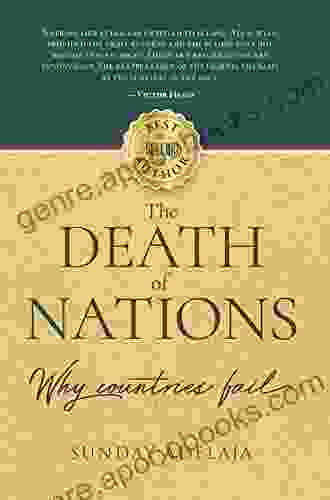The Death of Nations: Why Countries Fail

Extractive institutions are those that concentrate power in the hands of a few, and that use that power to extract wealth from the rest of society. These institutions can take many different forms, but they all share a common feature: they create a system of inequality, in which the few who hold power are able to enrich themselves at the expense of the many.
Some common examples of extractive institutions include:
- Autocracies: Autocracies are governments in which all power is concentrated in the hands of a single ruler. These rulers often use their power to extract wealth from the people through taxation, confiscation, and other forms of oppression.
- Oligarchies: Oligarchies are governments in which power is concentrated in the hands of a small group of wealthy and powerful individuals. These individuals often use their power to extract wealth from the people through monopolies, cartels, and other forms of economic manipulation.
- Kleptocracies: Kleptocracies are governments in which the leaders use their power to steal from the people. This theft can take many different forms, but it often involves corruption, embezzlement, and other forms of financial crime.
Extractive institutions are often associated with poverty and inequality. This is because they create a system in which the few who hold power are able to enrich themselves at the expense of the many. The people who live under extractive institutions often have little opportunity to improve their lives, and they are often forced to live in poverty.
4.6 out of 5
| Language | : | English |
| File size | : | 17568 KB |
| Text-to-Speech | : | Enabled |
| Screen Reader | : | Supported |
| Enhanced typesetting | : | Enabled |
| Word Wise | : | Enabled |
| Print length | : | 297 pages |
| Lending | : | Enabled |
| Hardcover | : | 200 pages |
| Item Weight | : | 10.2 ounces |
| Dimensions | : | 6 x 0.48 x 9 inches |
| Paperback | : | 210 pages |
Inclusive institutions are those that distribute power more evenly, and that protect the rights of all citizens. These institutions can take many different forms, but they all share a common feature: they create a system of equality, in which all citizens have the opportunity to improve their lives.
Some common examples of inclusive institutions include:
- Democracies: Democracies are governments in which all citizens have the right to participate in the political process. These governments are often more accountable to the people, and they are less likely to extract wealth from the people.
- Republics: Republics are governments in which the head of state is elected by the people. These governments are often more representative of the people, and they are less likely to be corrupt.
- Constitutional governments: Constitutional governments are governments that are based on a constitution that protects the rights of all citizens. These constitutions often limit the power of the government, and they protect the people from arbitrary rule.
Inclusive institutions are often associated with prosperity and growth. This is because they create a system in which all citizens have the opportunity to improve their lives. The people who live under inclusive institutions are often more productive, and they are more likely to invest in their future.
Geography can play a role in determining the types of institutions that a country develops. For example, countries that are located in remote areas or that have difficult terrain are more likely to develop extractive institutions. This is because it is more difficult for people in these countries to organize and resist oppression.
However, geography is not the only factor that determines the types of institutions that a country develops. There are many examples of countries that have overcome geographic challenges to develop inclusive institutions. For example, the United States is a country that is located in a remote area, but it has managed to develop a strong democracy with inclusive institutions.
Ultimately, the key to economic success is not natural resources or geography, but rather institutions that promote economic freedom and political stability. Acemoglu and Robinson's work shows that the path to economic development is not easy, but it is possible.
The Death of Nations is a powerful and persuasive book that has important implications for policymakers and citizens alike. It shows that the key to economic success is not natural resources or geography, but rather institutions that promote economic freedom and political stability. Acemoglu and Robinson's work is a must-read for anyone who wants to understand the causes of poverty and inequality, and the path to economic development.
4.6 out of 5
| Language | : | English |
| File size | : | 17568 KB |
| Text-to-Speech | : | Enabled |
| Screen Reader | : | Supported |
| Enhanced typesetting | : | Enabled |
| Word Wise | : | Enabled |
| Print length | : | 297 pages |
| Lending | : | Enabled |
| Hardcover | : | 200 pages |
| Item Weight | : | 10.2 ounces |
| Dimensions | : | 6 x 0.48 x 9 inches |
| Paperback | : | 210 pages |
Do you want to contribute by writing guest posts on this blog?
Please contact us and send us a resume of previous articles that you have written.
 Book
Book Novel
Novel Page
Page Chapter
Chapter Text
Text Story
Story Genre
Genre Reader
Reader Library
Library Paperback
Paperback E-book
E-book Magazine
Magazine Newspaper
Newspaper Paragraph
Paragraph Sentence
Sentence Bookmark
Bookmark Shelf
Shelf Glossary
Glossary Bibliography
Bibliography Foreword
Foreword Preface
Preface Synopsis
Synopsis Annotation
Annotation Footnote
Footnote Manuscript
Manuscript Scroll
Scroll Codex
Codex Tome
Tome Bestseller
Bestseller Classics
Classics Library card
Library card Narrative
Narrative Biography
Biography Autobiography
Autobiography Memoir
Memoir Reference
Reference Encyclopedia
Encyclopedia Suzy Pepper Rollins
Suzy Pepper Rollins Ryk Brown
Ryk Brown Kim Canavan
Kim Canavan Ward Serrill
Ward Serrill Vera Pavlova
Vera Pavlova Koji Kondo
Koji Kondo Martha Mier
Martha Mier Shannon Schuren
Shannon Schuren Kindle Edition
Kindle Edition Sarah Tate
Sarah Tate Summer Louise Truswell
Summer Louise Truswell Rebecca Stobaugh
Rebecca Stobaugh Louis Michael Seidman
Louis Michael Seidman Soma Victor
Soma Victor Yves Lugrin
Yves Lugrin Shirley Rousseau Murphy
Shirley Rousseau Murphy Wynne Harlen
Wynne Harlen Shelley Wood
Shelley Wood Kariem El Boghdadly
Kariem El Boghdadly Terence Mcsweeney
Terence Mcsweeney
Light bulbAdvertise smarter! Our strategic ad space ensures maximum exposure. Reserve your spot today!

 Terence NelsonRevolutionize Early Literacy: Designing Engaging and Effective Programs with...
Terence NelsonRevolutionize Early Literacy: Designing Engaging and Effective Programs with...
 Reed MitchellPractical ESL/EFL Activities for the Communicative Classroom: A Comprehensive...
Reed MitchellPractical ESL/EFL Activities for the Communicative Classroom: A Comprehensive...
 Ernest PowellRevolutionizing Patient Care: The Ultimate Guide to Implementing The Asca...
Ernest PowellRevolutionizing Patient Care: The Ultimate Guide to Implementing The Asca... Simon MitchellFollow ·17.9k
Simon MitchellFollow ·17.9k Johnny TurnerFollow ·7.6k
Johnny TurnerFollow ·7.6k Ian PowellFollow ·4.5k
Ian PowellFollow ·4.5k Herman MitchellFollow ·6.4k
Herman MitchellFollow ·6.4k Andrew BellFollow ·13.8k
Andrew BellFollow ·13.8k Francis TurnerFollow ·18.9k
Francis TurnerFollow ·18.9k Ryūnosuke AkutagawaFollow ·11.1k
Ryūnosuke AkutagawaFollow ·11.1k Dawson ReedFollow ·17.9k
Dawson ReedFollow ·17.9k

 Finn Cox
Finn CoxCarmen Suite For Flute Quartet (G Alto Flute) ( Carmen...
Experience the Magic of...

 Andy Cole
Andy ColeUncover Hidden Truths: A Comprehensive Guide to Detecting...
: The Silent...

 Ken Simmons
Ken SimmonsUnleash Your Potential: Transform Frustration and...
Are you tired of feeling...

 Rick Nelson
Rick NelsonHard To Kill: A Gripping Thriller That Will Keep You on...
Tom Rollins is a...

 Ivan Turner
Ivan TurnerUnleash the Power of Your Breath: Discover Breath...
In the tapestry of life, where stress and...
4.6 out of 5
| Language | : | English |
| File size | : | 17568 KB |
| Text-to-Speech | : | Enabled |
| Screen Reader | : | Supported |
| Enhanced typesetting | : | Enabled |
| Word Wise | : | Enabled |
| Print length | : | 297 pages |
| Lending | : | Enabled |
| Hardcover | : | 200 pages |
| Item Weight | : | 10.2 ounces |
| Dimensions | : | 6 x 0.48 x 9 inches |
| Paperback | : | 210 pages |








